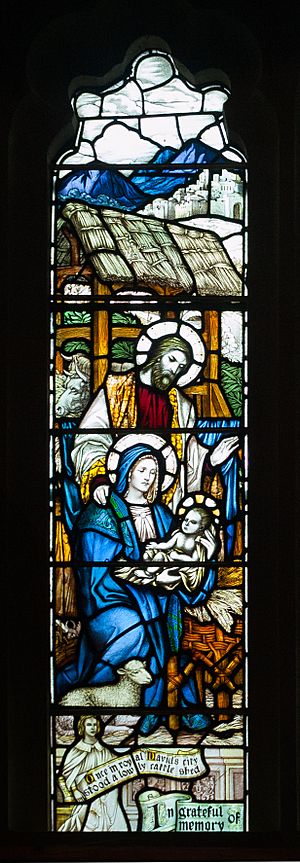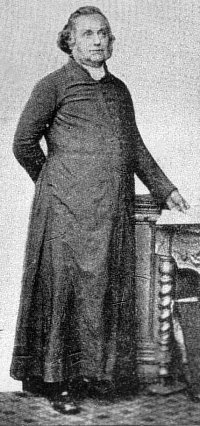Once in Royal David's City facts for kids
Quick facts for kids Once in Royal David's City |
|
|---|---|

Left light of the memorial window dedicated to Cecil F. Alexander in St Columb's Cathedral
|
|
| Genre | Hymn |
| Written | 1848 |
| Text | Cecil Frances Alexander |
| Based on | Luke 2:4–7 |
| Meter | 8.7.8.7.7.7 |
| Melody | "Irby" by Henry Gauntlett |
Once in Royal David's City is a very popular Christmas carol. It started as a poem written by Cecil Frances Alexander. This poem was first printed in 1848. It was part of her hymn book called Hymns for Little Children. Just one year later, an English organist named Henry Gauntlett found the poem. He then wrote music for it, creating the carol we know today.
Contents
The Story Behind the Song
Hymns for Little Children was a special book of poems. Cecil Frances Alexander wrote it to help children understand parts of the Apostles' Creed. This is a statement of Christian beliefs. The book was used in Sunday schools and at home. "Once in Royal David's City" told the story of Jesus' birth. It helped explain the part of the Creed that says "Born of the Virgin Mary".
Other famous hymns in this collection include "All Things Bright and Beautiful". This song taught about God as the "Maker of Heaven and Earth". Another well-known hymn was "There is a green hill far away". It explained the part about Jesus being "crucified dead and buried".
Cecil Frances Alexander was married to William Alexander. He was an Anglican clergyman. He later became the Archbishop of Armagh. Her most famous poems are remembered in a beautiful memorial window. You can see it at St Columb's Cathedral in Derry.
The Music and How It's Used Today
Henry John Gauntlett was a skilled organist. He played the organ in many churches in London. These included St Olave's and Union Chapel, Islington. He helped put together many hymnbooks. He also wrote over a thousand hymn tunes! But his most famous tune is "Irby". This is the music he wrote for "Once in Royal David's City".
Since 1919, a special event has taken place every Christmas. It's called the Festival of Nine Lessons and Carols. This festival happens at the King's College Chapel, Cambridge. The Christmas Eve service always begins with "Once in Royal David's City". Dr Arthur Henry Mann created a special version of the song for this service. Mann was the organist at King's College from 1876 to 1929.
King's College Tradition
In Mann's special arrangement, the first verse is sung by a boy. This boy is a solo singer from the college's choir. The second verse is then sung by the full choir. Finally, the people listening join in for the third verse. The hymn is played on the organ for all verses except the first.
Erik Routley, a music expert, wrote about Mann's arrangement. He said that it changed the song's feeling. It made the simple children's hymn sound very grand. It filled the large chapel with a wonderful, spacious sound.
The King's College Choir has a unique tradition. The boy who sings the first verse is usually chosen right before the performance. The choirmaster listens to the boys' voices. He picks the one whose voice sounds strongest that day. This happens just before the live broadcast begins.
This carol was also the first song the King's College Choir recorded for EMI. This happened in 1948, with Boris Ord leading the choir.
The Full Poem
Here are the words to the carol "Once in Royal David's City":
1 Once in royal David's city
Stood a lowly cattle shed,
Where a mother laid her baby
In a manger for his bed:
Mary was that Mother mild,
Jesus Christ her little Child.
2 He came down to earth from heaven
Who is God and Lord of all,
And his shelter was a stable,
And his cradle was a stall:
With the poor and mean and lowly,
Lived on earth our Saviour holy.
3 And through all his wondrous childhood
Day by day like us he grew,
He was little, weak, and helpless,
Tears and smiles like us he knew:
And he feeleth for our sadness,
And he shareth in our gladness.
4 And our eyes at last shall see him
Through his own redeeming love,
For that Child so dear and gentle,
Is our Lord in heaven above:
And he leads his children on
To the place where he is gone.
5 Not in that poor lowly stable,
With the oxen standing by,
We shall see him: but in heaven,
Set at God's right hand on high,
Where like stars his children crowned,
All in white shall wait around.
 | Dorothy Vaughan |
 | Charles Henry Turner |
 | Hildrus Poindexter |
 | Henry Cecil McBay |


